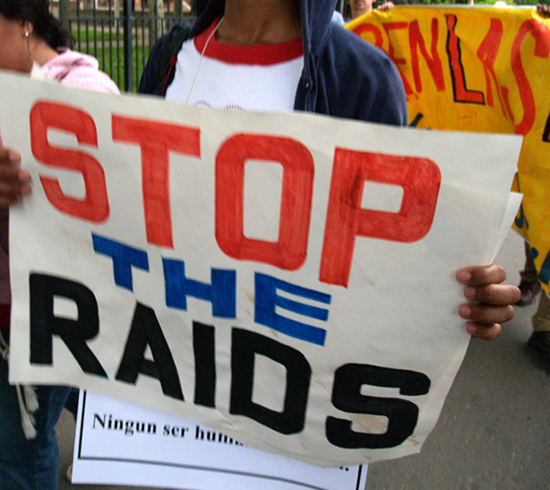(NEW YORK) MintPress — On June 6, 2007, more than a dozen federal immigration agents, along with local, state and federal law enforcement officials, conducted a series of raids on homes in New Haven, Connecticut and arrested 29 illegal Latino immigrants. 11 of the men filed a civil rights lawsuit, and on Valentine’s Day they had their day in court, reaching a landmark settlement of $350,000 with the United States government.
The settlement in New Haven is the latest ruling in the tri-state area against officials who have acted outside the law. Just last week, a federal judge approved a $15 million settlement in a class-action lawsuit charging that the NYPD had unlawfully arrested 22,000 people, most of them minorities, over a period of nearly 30 years under laws that had long been declared unconstitutional.
In 2010, a federal judge had held New York City in contempt of court for “obstinance and uncooperativeness,” ruling that the NYPD, beginning in 1983, had continued to make arrests for loitering to panhandle or to search for a sex partner and for waiting in a bus or train station. Federal and state courts had struck down those laws, between 1983 and 1993, as violating First Amendment rights.
In both cases, there was more than monetary compensation. In the ruling against the NYPD, there was also a promise that officials would help the courts vacate and seal all convictions stemming from the arrests. In the New Haven settlement, the government agreed not to deport the men.
“It shows what can happen when people have the courage to stand together to defend their basic human rights,” said Michael J. Wishnie, co-director of the Worker and Immigration Rights Advocacy Clinic at Yale Law School, whose students defended the New Haven immigrants.
.
Racial profiling charges
The plaintiffs in New Haven allege they were targeted because they are Latinos. The lawsuit claimed that during the raids, armed federal officers violated their constitutional rights by arresting them in their homes without warrants and without inquiring about their immigration status, informing them of their rights or explaining why they were being detained.
The courts have held that the rights and freedoms of the U.S. Constitution, applies to all U.S. residents, legal and illegal.
The operation began two days after New Haven approved a plan to offer identification cards to all city residents, including illegal immigrants, to give them better access to public services and to help the police confirm their identities in case they became victims of crime. None of those arrested had criminal records themselves.
The lawsuit claimed that the raids were in retaliation for the plan, a charge the federal government denied.
.
Government denies wrongdoing
Immigration and Customs Enforcement (ICE), an arm of the Department of Homeland Security, said in a statement that the settlement was not an admission of wrongdoing, adding that “the government is settling in order to avoid the additional time and expense of further litigation.”
The lawsuit named 16 defendants, 14 officers who carried out the raids and two supervisors, including Julie L. Myers, who was head of ICE at the time.
Federal officials have argued that the men had already been ordered by judges to leave the country and were arrested in one of many routine fugitive operations conducted by teams of immigration agents deployed all over the U.S.
At the time, however, New Haven Mayor John DeStefanos Jr. questioned that explanation, saying “There are in American 11,000 cities, towns and villages, but somehow, by some act of circumstance or coincidence, within 36 hours (of the decision on I.D. cards) the response was in New Haven.”
.
Furor over immigration policy
The settlement is a small victory for President Obama’s Hispanic supporters, who have been dismayed that the administration, instead of pushing for comprehensive legislation to address immigration reform, has focused on deportation. There have been more than 1.1 million deportations since Obama’s term began, the highest number in six decades.
Yet the administration maintains that its goal is to quickly deport convicted criminals, while in many cases halting the deportation of illegal immigrants with no criminal record.
Meanwhile, there has been a flurry of immigration legislation at the state level. In December 2011, the Supreme Court agreed to decide whether Arizona can impose tough laws. Among them is a law enacted in 2010 and challenged by the Obama administration that requires police to question people whom they stop about their immigration status.
There are likely to be significant implications of the Court’s decision for immigration policy on both the state and national levels.
.
Source: MintPress
.


